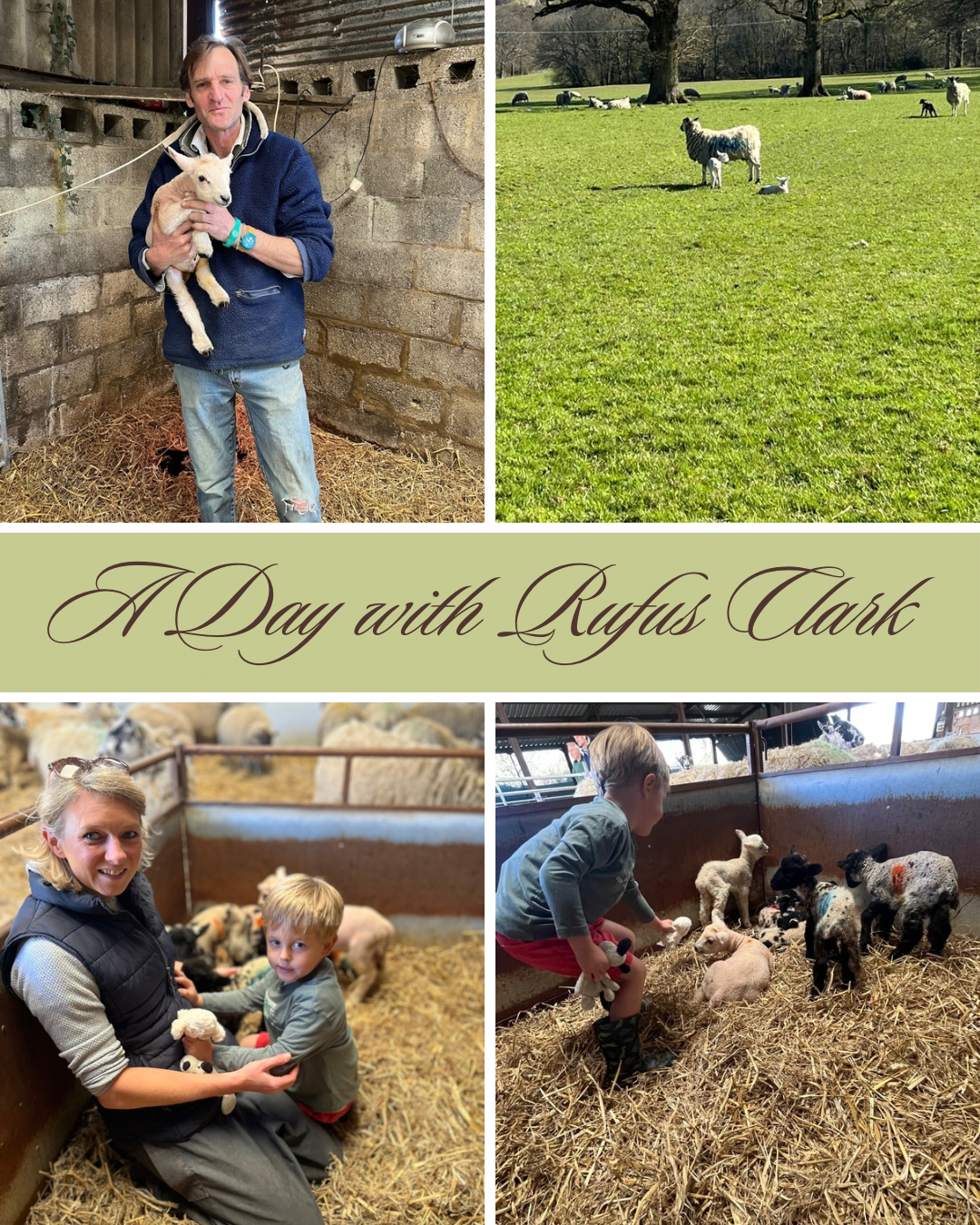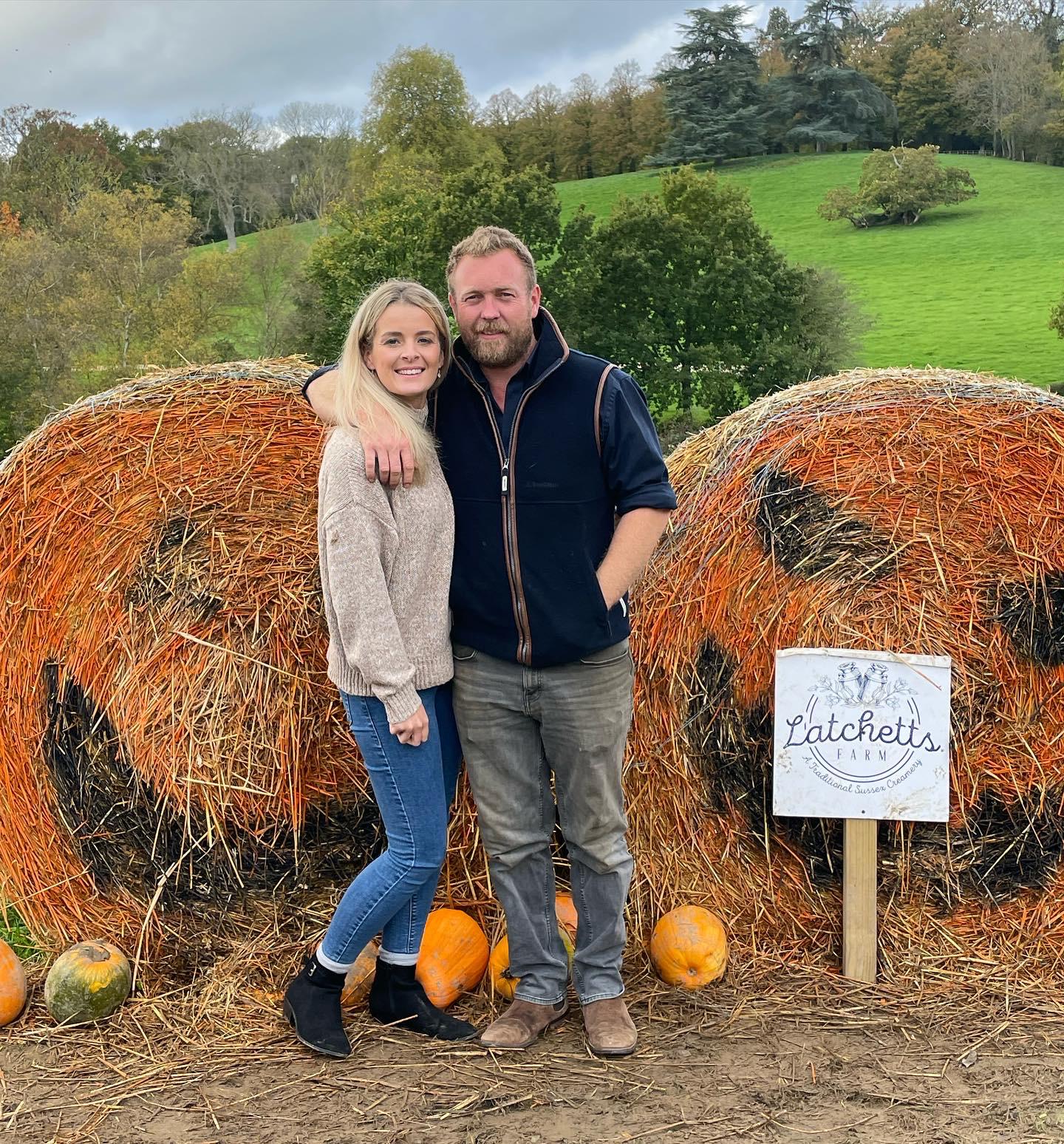Meet Our Farmers
Meet Our Sheep Farmer – Rufus Clark
Rufus farms his sheep just down the road from us at Cinder Hill, Horsted Keynes. His Grandparents brought the farm as a shooting estate in 1911 and then decided to grow fruit. In 1987 with the great storm many of the fruit trees were lost and so they tried arable farming. As many of us know around here, the soil is not suited to arable farming in this area and with the location of the farm, near the Ashdown Forest and an area of outstanding natural beauty, Rufus has said it is hard to diversify.
Rufus’s grandfather always kept sheep and Rufus has now followed in his footsteps with around 500 ewes, he now farms North country mules and uses a mixture of Suffolk and Texel tups. I did all my lambing experience with Rufus when I was at Vet school and now I am so pleased to be taking my son there to meet the lambs too. We are extremely lucky to be supplied by Rufus as the market has changed a lot in the last 15 years. Rufus used to sell a lot of meat directly from the farm but now as peopl’s lifestyles have changed, the majority of people are not buying directly from the farms but from the supermarkets. The other issue that he faces in this area is the unavailability of the abattoirs which has led to Rufus now selling a lot at market rather than from the farm itself.


Meet Our Sussex Bee Keepers – Kerry and Helen
Pure Honey from Sussex, Crafted with Love
At Little Bees Larder, we’re two jolly beekeepers, dedicated to the wellbeing of our buzzing family. Our bees are our top priority, and their exceptional honey is a testament to our commitment.
From Hive to Your Table
As food enthusiasts, we wanted to explore the myriad of ways to enjoy our honey’s beyond just spreading it on toast. With an abundance of honey and a passion for flavour, we began experimenting with new infusions and flavours whilst trying to preserve the natural essence and benefits of honey.
Community-Tested and Approved
Our award winning honey, honey marmalades, honey infusions and honey sauces were an instant hit with our local dog training group, DeWolf Dog Training, as well as our family and friends. Their enthusiasm inspired us to establish Little Bees Larder in January this year, where we continue to innovate and develop new flavours. Inspired by our wish to support loved ones with ailments like arthritis, cancer recovery, and flu, using honey’s natural benefits.
Ethical Beekeeping
We prioritise our bees’ needs and never over-harvest for commercial gain. Our honey is primarily for our bees, and we only sell seasonal products like cut honeycomb at their peak quality. All our products are handmade in small batches.
Taste the Sussex Countryside
Our honey reflects the rich nectar collected by our bees from the beautiful Sussex countryside. We’re proud to share this natural treasure with you and hope you enjoy our unique flavours this evening.
A Collaboration of Likeminded Sustainable Producers.
We are thrilled to further collaborate with The Butler’s Pantry, Heaven Farm, who share our love of animals and animal welfare. We will soon be installing a new apiary to provide honey for The Butler’s Pantry, as the farm cultivates new wildflower meadows and sunflowers for our bees. Wax and Bee information workshops and supporting with child education events.
Meet Our Heaven Farm Beef Farmer David Butler a.k.a Dad
Son of a farming family, farming cattle for 300 years, David was brought up in a mixed farming business with the main focus on Dairy and beef production. The family established a successful commercial farming business from the 1960’s to early 2000 directed towards commodity production.
Following the breakdown of the European farming support system and the introduction of Globalisation of all food products, farm income certainty and reliability became volatile. In the last ten years, David recognised the value of local markets which demand traceability of all food and provide the best return for higher quality products.
Our Sussex farm is based on clay and Ashdown sand soil types, with naturally poor fertility and small field sizes which steered him towards grass based systems which also produce the best milk and tastiest beef. We have avoided producing products that others have already established so we have invested in niche products such as gelato and a Sussex beef herd for high quality beef production based on grass.
Beef farming is worldwide. There are limitless systems to produce beef and the choice of system depends on the individual farmer, climate, soil and market of the location. Cattle and sheep represent a valuable source of digestible protein in areas that cannot grow digestible crops for humans, therefore beef and sheep production will prevail in all areas of the world as a source of reliable food.
The Sussex cow is a traditional breed, often classed as a rare breed. Most regions of the UK have a breed that suits their location. The Sussex cow is well suited to a grass fed system. The cattle are low maintenance with a calm, relaxed temperament making them suitable for our farming system of a longer life roaming the Sussex fields as a family herd. They are best suited to suckler cow systems where the calf stays with their mother for most of its life, which we believe is better for their welfare in comparison to the intensive concentrate fed systems of the USA. As a grass fed breed, they take longer to mature but our cows lead a happier, longer more natural lifestyle and that in turn gives us our wonderful Sussex beef.


Meet Richard Bates, our Chelwood Gate Pig Farmer!
When you meet him I am sure you will love him as much as I do!
Married to his wife Linda, with their three boys, Richard is a true country gent who takes pride in his passion of pig farming.
Richard’s grandmother bought the farm in Chelwood Gate in the 1940’s, which traditionally was a fruit farm and market garden. After Richard’s father came back from national service, rather than buy in manure for the fruit trees they decided to get some pigs, and this is how their farming story began!
Richard’s father then switched the farm to predominantly Wessex pigs and the fruit production ceased. Richard joined after school and worked full time in 1973. Since then, as the pig industry has evolved, the breeds used became landrace and other white breeds of pigs to improve productivity and genetics for leaner meat. As the farm grew to its peak, Richard was farming 180-220 sows and therefore with their offspring, there were around 2000-2500 pigs on the farm at any one time.
This changed around the year 2000. Pig farming had been struggling for years in the UK by this time, due to supermarkets being the main buyers and setting the buying price, leaving the farmers out of pocket.
The introduction of EU laws on pig production, which improved welfare of pig production in the UK, was not followed by the rest of Europe, which has since ruined the UK pig farming industry.
Around 2003, the financial situation worsened as the price of feed doubled and Richard’s plan was to try and increase sales to local shops and sales directly to the consumer. This led to decreasing the number of sows, which went down to ten over a matter of two months and Richard started taking his own pigs to the abattoir.
Richard now produces 25 pigs a month rather than 400. This has dramatically changed the welfare for the pigs. The stocking density has improved massively; all are now on straw inside and outside in the summer. It has also decreased the risk of disease, which consequently has meant no need for vaccinations for the herd. Farrowing is inside in houses and now becoming more free roaming, so the sow can roam freely with piglets. This also means that Richard has not had to dock tails for years, as due to lower stocking density the vices such as tail and ear biting are now zero.
All of Richards customers ask why his meat tastes so much better and his answer is:
The flavour and texture of the pork. Most farmers are buying in feed for automated systems. I make my own feed rations 75% wheat, barley and then soya bean meal and full fat soya, the same ration for all the pigs irrespective of age. They therefore grow more slowly, and more time is spent enjoying life, the result being the pork is better and therefore the sausages!
Meet Grant Butler and Zoe Leycester, Latchett’s Gelato Parlour, Heaven Farm
A 4th generation dairy farmer, Grant’s great Grandad and Grandad moved from Henfield in Freshfield Lane at Latchett’s farm, Danehill, with six cows and a bicycle in 1952. Through doing the milk round they managed to buy more cows and buy Heaven Farm to expand the dairy business. Through contract farming and tenancies, later joined by his son David (a.k.a. dad) by 1980 built up the cow numbers to 900 cows.
David then expanded again to buy a farm in Dorset and in 2012 they were milking 2000 cows. Due to TB and loss of land locally, herd numbers started to diminish and only one herd of cows remained by 2017.
It was with this instability that Grant started Latchetts Farm Ltd in 2019 to try and improve the margin on the milk sales, going back to selling directly to the consumer rather than dealing with larger processors. In 2021 they sold their last herd of cows to focus on diversiufication activities, beef and arable production. Luckily David manages a 600 cow farm locally for them to add their cows to in order to continue the cow to cone ethos for their ice cream.
In 2019 Latchett’s made 3 tonnes of ice cream, last year they made 100 tonnes!
Zoe, Grant’s fiance, joined in 2024 from her family bakers in Newick with great understanding in traceability of produce and customer service. Zoe handles all the marketing and social media for their family business, their wedding date is 20th June 2026!
Congratulations Grant and Zoe!

